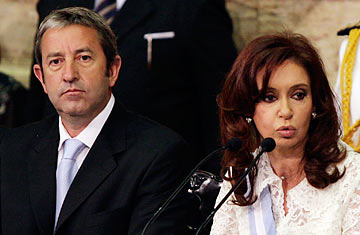
President of Argentina, Cristina Fernandez, right, sits with her Vice President, Julio Cobos, left
Argentina's President Cristina Fernandez is known for speaking her mind. Last week the controversial leader accused her own Vice President Julio Cobos of plotting to destabilize Argentina and cause the fall of the government to further his own ambition. "Cobos wants to become President before 2011," Fernandez said in a speech Jan. 12. The President said her deputy, whom polls have as a front runner in next year's presidential race, is part of a dark "conspiracy" plotting to overthrow the government and that he has become the "de facto leader of the opposition."
The President's Cabinet chief and most trusted aide Anibal Fernandez (no relation) expressed his boss's dislike for Cobos more bluntly two days later: "Cobos cannot be trusted with the management of public affairs. The Vice President has become Cobos Iscariot." The President's supporters are concerned Argentina's veep might make use of the President's absence during an upcoming trip to China to call a special session of Congress and reject a recent executive decree ordering the seizure of central bank reserves to pay off part of Argentina's voluminous foreign debt. "Cobos has clearly become the leader of the opposition and has been making use of the vice presidency to block the legislative bills of this government," pro-Fernandez legislator Agustin Rossi said.
What seems to have particularly infuriated the President and her supporters is Cobos' attempt to mediate in the standoff between the president and Argentina's autonomous central bank, which has refused to hand over $6.6 billion that the cash-hungry government says it needs to pay off foreign creditors. Opposition legislators see the request for cash as the latest in a series of asset grabs by Argentina's Peronist government and a populist play ahead of next year's elections. When President Fernandez used an emergency decree to order the seizure of assets last month, opposition members obtained a court injunction to stop them.
Many Argentine economists believe the central bank reserves are the only safe bulwark against a spike in inflation and potential economic collapse. Cobos, who says the assets cannot be transferred without consulting Congress first, has repeatedly denied the charge of conspiracy. "If there's any conspiracy it's against the Vice President," he said after Fernandez's outburst this week. "She doesn't consult anything with me, there is no dialogue. I am a human being. I have emotions. I hurt."
Cobos belongs to Argentina's middle-of-the road Radical Party, which lost its role as the counterbalance to the populist Peronists when Argentina's dual-party system broke down following the downfall of the disastrous Radical administration of President Fernando de la Rua in 2001. Economic collapse and social unrest led Argentina to default on $141 billion in foreign debt. Since then, the rambunctious Peronists have dominated Argentina's political scene, first under Nestor Kirchner, who oversaw the country's return to decent economic health, and then under his wife Fernandez, who was labeled Argentina's new Evita when she won the presidency herself.
In comparison to the colorful Fernandez, Cobos seems drab. A soft-spoken family man who was dean of a technological university in the wine-growing province of Mendoza, Cobos became provincial governor in 2003 and then quit the Radical Party so he could run as Fernandez's No. 2. Relations between the two quickly soured. Since assuming office, Fernandez has renationalized companies that were privatized in the 1990s including airlines and public utilities, and privatized pension-fund assets worth $30 billion. She also led the country to the brink of a civilian uprising over her brash attempt to levy a hefty tax on the country's lucrative soy exports in 2008. The move, announced just prior to the commencement of the yearly harvest, enraged farmers and caused a revolt that enjoyed widespread popular support. Peace was restored only after a cliffhanger congressional vote against the proposed tax in which Vice President Cobos cast the deciding negative vote, saying he believed "national peace" was a higher priority than a new tax. That move earned him the undying enmity of Fernandez.
Fernandez now argues that there is a "conspiracy" between the central bank president Martin Redrado, Vice President Cobos, farmers and the country's media moguls who have begun reporting on corruption in her administration. She has also claimed that Redrado and Cobos are in league with the "vulture funds" and "river rats," as she terms the foreign creditors who hold a large part of the country's debt. "Cobos is the leader of the opposition and wants to be a candidate, but he could be a candidate without conspiring against the government," the President argued this week.
